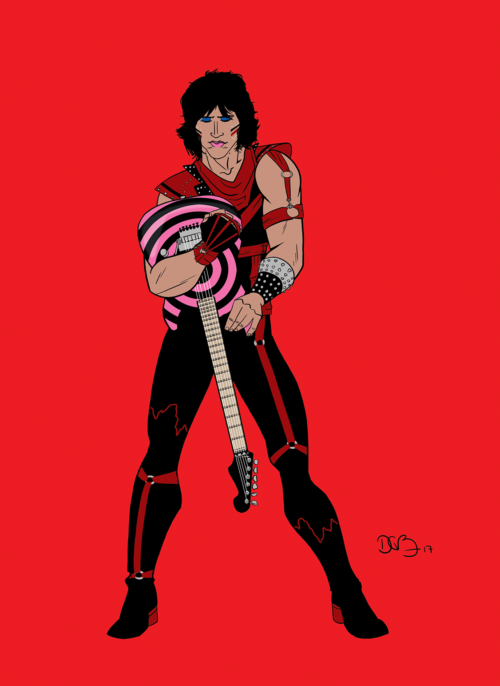Sketch Fridays #45 – Eddie “Fingers” Ojeda

Sketch Fridays #45 – Eddie “Fingers” Ojeda (lead guitarist, backing vocals)
Most people know Twisted Sister’s biggest hit, “We’re Not Gonna Take It,” which is probably one of the only heavy metal hits written in a major key, and while that song is fine, the band (as any fan of any band would say) has so much more substance than that song shows. By the time that song hit the airwaves, the band had been around for eight years already and had been regionally successful, selling out arenas in the tri-state area to thousands of people. Their success with Stay Hungry‘s lead single, “We’re Not Gonna Take It,” in hindsight, acted more as the icing on the cake that had spent nearly ten years baking.
In fairness, “We’re Not Gonna Take It” is a good encapsulation of what the band stood for in a way that appeals to as broad an audience as possible––they didn’t compromise anything about themselves with that song––and part of a look through their catalogue shows that their biggest hit was the result of an evolution rather than a lucky strike while the iron was hot. Jay Jay French once described the band as what you would get if Alice Cooper were blended with British rockers, Slade (the originators of the song, “Cum On Feel The Noize,” which would later be covered by Quiet Riot), and it is in the latter that I think Twisted Sister, and specifically Dee Snider’s songwriting motivation, owes more than even the band wants to let on.
Slade’s “Cum On Feel The Noize” and its predecessor, “Mama, Weer All Crazee Now”, are raucous party songs that culminate in a crowd singing along, a crowd much larger than what can be comprised of just the band itself. In an interview with Slade’s lead singer, Noddy Holder, he said that it was an attempt to capture the feel and sound of a live show on a record. This anthemic, participatory sound and structure is at the heart of Dee Snider’s songwriting, starting in the late seventies where we can not only hear the influence of Slade’s aesthetic and groundbreaking recording choices (and, perhaps, their choices of clothing) but also the seeds for what would become “We’re Not Gonna Take It.”
If this connection were solely because Twisted Sister and lead songwriter, Dee Snider, were fans of Slade, it would make sense, but the connection is even stronger when one considers that Twisted is generally considered to be a premier live band. They ran high-energy shows, right up until they called it quits at the end of 2016 (marking Dee’s 40th year with the band) and a highlight of their shows, as can be heard in the plethora of recordings, is how interactive the band and Dee is with the audience. From the call-and-response, Slade-ish type of choruses to Dee’s “raps” with the audience, which could be lengthy monologues in their own right, audience participation was a key element to the band’s image as well as its success, and every time Dee swung for a big hit, it always included that element, especially in the codas when the songs idled on what sounded like a mob chanting the chorus while Dee improvised over them.
With each album, a version (though not literally) of what would become “We’re Not Gonna Take It” exists; from the earliest attempt with “I’ll Never Grow Up Now” in which Dee is barely recognizable to the club hit, “Bad Boys of Rock and Roll”, it’s clear that Dee has a tone he’s going for and that it’s very much a cry for an entire demographic rather than just of a band as both songs proudly devolve into chanting, riffing, but controlled, chaos. With their first major label release, the band finds a focused and largely successful iteration in “I Am (I’m Me)” which proved to be a mild hit overseas. Again, though, the structure is clear, continuing in a straight line all the way from Slade.
Once “We’re Not Gonna Take It” landed (along with the second single from the Stay Hungry album, “I Wanna Rock”), Twisted’s follow-up album, Come Out and Play, didn’t really have an analogue, which I feel is to the band’s credit. With their fame and success, they decided to go bigger and more melodramatic with the opener and title track (which I like very much). It wasn’t until their final album, Love Is For Suckers, that Dee returned to the well one last time, but the take was decidedly different––more tired and wizened, but no less ferocious. That track, “Wake Up (The Sleeping Giant)”, stands in stark contrast to the rest of the album and honestly feels like one of the few “genuine” Twisted Sister tracks from it, even quoting from their previous hit when Dee cries out in a pre-chorus build-up: “We took all we’re gonna take.” It’s focused and profound but it falters in that it is a singular song, lacking the party-like atmosphere of “We’re Not Gonna Take It” and its antecedents, moving away from being more inclusive to being more militaristic. As an angry teen, “Wake Up” was the song from this lineage that I liked the most and still gives me chills when I listen to it today.
Why it was that “We’re Not Gonna Take It” was the one that broke through, I’m not sure. Its chorus was a finely honed chant that anybody could sing with a sentiment anybody could get behind. The cynical answer would be that with all the attempts at the formula, one would eventually stick with a larger audience. Part of it, if we’re to talk musically, surely has to do with its melody. As mentioned earlier, despite its anarchic lyrics, the major key in which it’s written lends an air of, for lack of a better word, patriotic or, at the very least, empowering attitude. The driving melody, repeated ad nauseam to great effect, is echoed in the lead by guitarist, Eddie “Fingers” Ojeda, who, despite being a clever and capable lead player, sticks to the main melody for the solo break in the middle of the song. For me, as an amateur player, I wouldn’t be surprised if the band didn’t realize the song was written in a major key (it’s easy to miss these things) and they couldn’t figure out what a more traditional, minor key solo didn’t sound right. When in doubt, stick with what works, and it’s hard to ignore the power of that melody and affixing that to the guitar solo only makes the song feel more like a grand anthem than just another rock song. If anything, I feel it is more of a vindication and validation of Slade––who never really broke through in the States––than Quiet Riot’s begrudging cover ever was. For Quiet Riot, “Cum On Feel The Noize” was a single shoved upon them by management. For Twisted Sister, Slade and “Cum On Feel The Noize” was buried treasure that they invested in wisely and personally.
I bring these songs up because these are a big part of Twisted Sister’s oeuvre, but they’re the songs I have the least connection to. They’re fascinating and fun, but they’re more statements of purpose to the outside world, speaking for the people Twisted Sister represents rather than speaking to them. For a band (and genre) that, superficially, can be quite off-putting, these songs stand as evidence that the doors to “our” world was not closed but, in fact, wide open to anybody. While their powerful, simple music and garish clothing and makeup could be misinterpreted as a statement of “If you don’t look weird and scream loud then you don’t belong,” their actual message––and one that I thankfully found as I gathered their catalogue in my teens––was much more humanistic, bold, and important: “Be yourself.”
This week’s drawing of Fingers was actually kind of difficult. In a band full of personalities, from Dee’s gregariousness to Jay Jay’s general cool to Mark “The Animal” Mendoza’s brute force to AJ Pero’s silliness, I fear Eddie gets buried underneath them because, of all the members of the band, he comes across as the musician. To be fair, all the members are capable musicians, but it comes across that Eddie is the guy that just loves to play music. Not only is he humble enough to share lead guitar duties with Jay Jay, but he is the only consistent backing vocalist in the band, and it would be irresponsible of me to say that Dee alone is the voice of the band. If you took away Eddie’s backing vocals on all of Twisted Sister’s songs, the band would sound completely different. Where Dee was the attitude and Jay Jay was the smarts, Eddie was the passion that made this group a band.

Discussion (2) ¬